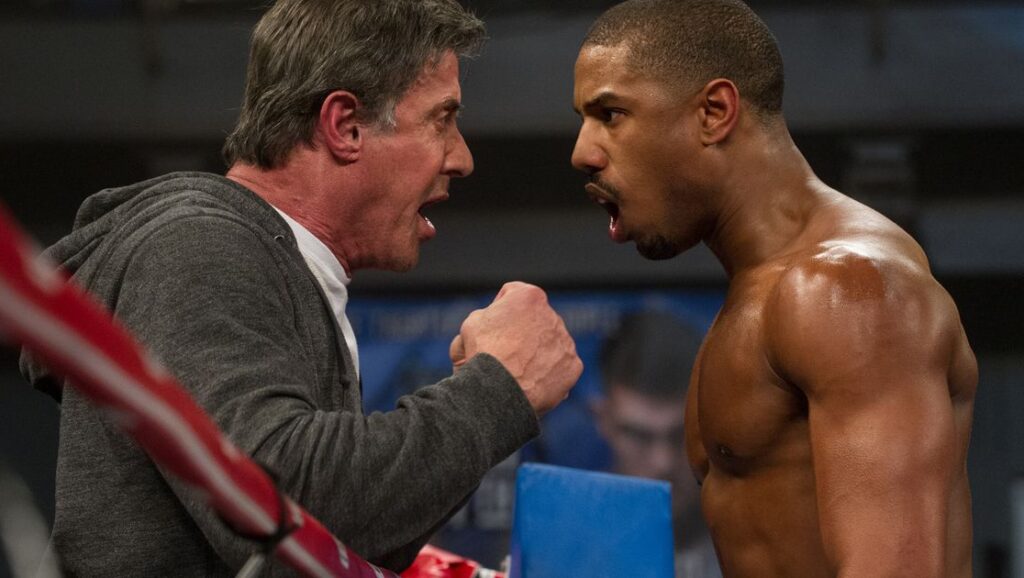Ryan Coogler’s Rocky spin-off Creed begins, evocatively, in a juvenile corrections facility. A handsomely framed shot depicts a line of African-American boys filing through a gated door, before the camera pushes into the room on the other side where a fight has broken out. At the center is our young protagonist, Donny Johnson, née Adonis Creed (Alex Henderson here, Michael B. Jordan as a man). Soon, Don is whisked off to an antithetically plush life in a mansion with his heavyweight champion father’s widow (Phylicia Rashad). But because the Rocky series has always been about underdogs, an adult Don inevitably tires of this life and leaves his white-collar L.A. job for a new home in a financially-destabilized Philadelphia. He wants to pursue his dad’s profession, but on his own terms: he refuses to go by the famed surname, though he does seek the training of one Mr. Balboa (Sylvester Stallone), who is still retired, running his restaurant in downtown Philly.
Several scenes in Creed are punctuated by iconographic gestures—loving yet trivial fan service—leaving the film’s effectiveness as a standalone work questionable early on. Coogler and cinematographer Maryse Alberti (Crumb, Velvet Goldmine, The Wrestler) have a knack for composition, but the director’s pacing feels rushed and uneven, at least until Adonis establishes connections in his new city. An inconsistent tone is spurred by a both casual and reverent relationship to the Rocky mythos, building on the audience’s familiarity with the series while shakily carving out its own identity. This conflict never quite resolves, as obligatory training montages and other concessions to sports movie tropes pad out the two-hour-plus runtime.
The filmmakers’ willingness to ground the proceedings in intimate human detail, however, enlivens a film that can feel standard and obligated by expectations. A shot of Adonis and love interest/downstairs neighbor Bianca (Tessa Thompson) lying on her apartment floor is disarmingly composed, with their faces shown upside down in the frame, succinctly communicating the way newfound love can shake up our self-contained worlds. Close-ups on the actors’ faces are utilized throughout, and Coogler’s patience in teasing out these instances of human contact pay off.
But it’s Jordan who keeps us most engaged, captivating our attention in Coogler’s tight, intense frames. This is a movie star’s performance, and Jordan expertly oscillates between underplaying and seizing his moments. The dramatic arc the actor maneuvers is unsurprising (various cycles of betrayal and redemption—proving his way into developing a tight bond with his mentor), but the impressiveness of Jordan’s performance is his ability to wring emotion out of the seemingly rote. Jordan guides us to a ‘big game’ finale that’s the most transfixing of its kind in recent memory due to the feelings of empathy the audience gains for him. In this sequence, every bruise on his face and inch he moves toward the ropes feels credibly life or death.
Though one never quite shakes the impression of franchise re-entry ordinariness, the film’s cumulative effect is gripping and rife with tensions physical and cultural alike.
Deeper than just rousing sentiment, Jordan and Coogler’s choices register a shared goal of fitting the film with a precise cultural identity. In Creed’s best scene, Adonis and Bianca go on their first date to a cheesesteak restaurant, one where you seat yourself and the sandwiches are unceremoniously wrapped in tinfoil. The location feels appropriately modest in scale, but it’s the pair’s dialogue that stands out: Bianca takes the conversational lead by distinguishing her fluent street vocabulary, and what she identifies in her friend, despite his chosen milieu, as an affluent and educated air—“You’re not a square exactly, but…” she quips. Bianca charmingly and authentically drops the word “jawn,” explaining that it could mean literally any noun (“This table’s a jawn, this restaurant’s a jawn,” etc.). The exchange sketches the two characters and their places in modern black culture, and without stooping to the clumsy sermonizing of, say, Rick Famuyiwa’s Dope.
Adonis and Bianca have a shared goal of fighting, a word that’s practically deconstructed via its constant usage during this franchise reboot. Bianca has degenerative hearing, the tragic irony of which, her being a singer by trade, is never overplayed. Adonis’s struggle is, perhaps problematically, self-created, as his decision to forgo a life of privilege is made with the assurance of a safety net. But the young boxer’s decision to train in a gym in a predominantly black neighborhood has the effect of rallying the dirtbike-riding children on the block, making Adonis’s fighting inextricably linked to a unified yet disadvantaged community. The film’s racial uplift narrative is accented by spot-on music selections, including a choice transitional cue of the Roots’ John Legend-featuring “The Fire,” and a new cut from Future, whose “March Madness” proved a stirring response to the prejudiced bloodshed haunting the pubic conscience this year. Such pleasures lie in Creed’s subtextual margins, and though one never quite shakes the impression of franchise re-entry ordinariness, the film’s cumulative effect is gripping and rife with tensions physical and cultural alike.

